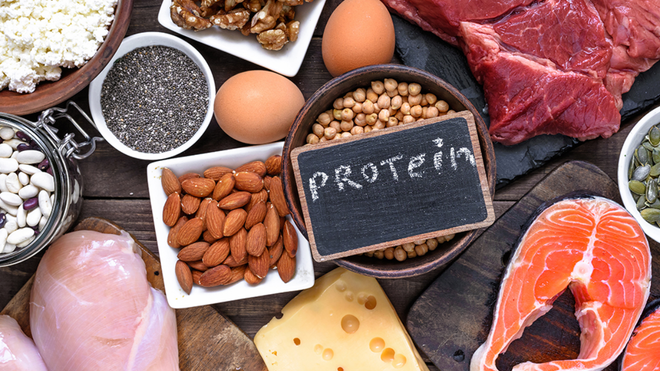Are you constantly tired, experiencing hair loss, cravings for junk food, and mood swings? If you have these symptoms, there's a good chance you're lacking protein and need to change your diet to protect your long-term health.

ZaloFacebookTwitterPrint Copy link
Protein is one of the most important nutrients our bodies need to function properly. Protein plays a vital role in muscle growth, hormone balance, tissue repair, and immune support.
According to the World Health Organization (WHO), an adult needs about 0.8g of protein per kilogram of body weight per day. However, many of us are not eating enough protein, which can lead to long-term health consequences.
Protein deficiency can manifest itself in small changes, but you should not be subjective. Below are 8 warning signs that your body is lacking this important nutrient. Understanding these signals can help you change your diet in time to ensure your health.
Protein is the source of raw materials to maintain muscle mass and energy for the body. When you do not consume enough protein, the body is forced to break down muscle for energy. As a result, you feel tired and lethargic even though you get enough sleep and eat normally.
According to research published in the Journal of Nutrition (2020), people who eat low protein in their weight loss diet often feel tired and have poorer recovery than those who eat enough protein.
Hair loss, weak and brittle hair
Hair is made up primarily of keratin - a protein. When the body lacks protein, the keratin production process is interrupted, causing hair to become dry, brittle, and prone to breakage, leading to thinning hair in the long run.

A study in Dermatology Practical & Conceptual (2017) found that dietary protein deficiency is one of the common causes of diffuse hair loss, especially in women.
Frequent snack cravings
If you find yourself craving sweets, starches, or fried foods, especially in the mid-afternoon or late evening, your diet may be lacking in protein. Protein helps stabilize blood sugar and keeps you feeling full longer.
A study from the American Journal of Clinical Nutrition (2015) showed that people who ate a high-protein breakfast felt fuller longer and ate fewer calories throughout the day than those who ate a low-protein breakfast.
Decreased muscle mass, muscle weakness
Protein is the main ingredient for maintaining and building muscle. If you find yourself feeling weaker, tired more quickly after strenuous exercise, or your muscles are losing their shape, it is a sign that your body is lacking protein to maintain muscle mass.
Especially for people over 40 years old, sarcopenia (age-related muscle loss) will occur faster if the diet is poor in protein.
Long-lasting wounds
Protein is essential for tissue repair and wound healing. If you find that minor cuts, bruises, or surgical incisions are taking longer than usual to heal, check your daily protein intake.
Experts from Cleveland Clinic (USA) emphasize that post-operative patients or injured people need to increase protein to help the recovery process take place quickly and limit infection.
susceptible to illness, poor resistance
Protein helps produce antibodies and maintain a healthy immune system. Lack of protein makes the body susceptible to colds, sore throats, and infections.

The Journal of Clinical Nutrition (2020) published that people with protein deficiency have a 20% higher risk of respiratory diseases and skin infections than people who eat enough protein.
Wrinkled, inelastic skin
Collagen - a protein that makes up the skin - decreases when the body lacks protein. The result is dry, wrinkled, less elastic skin and wrinkles appearing earlier than expected.
In addition, the area around the eyes, corners of the mouth or neck is prone to wrinkles and sagging if there is a prolonged lack of protein.
Mood swings, irritability
Protein also affects the brain by participating in the synthesis of neurotransmitters such as serotonin and dopamine. Lack of protein makes you irritable, easily irritated, reduces concentration and makes you moody.
Research from the Journal of Psychiatric Research (2019) shows that a low-protein diet significantly affects the psychology and ability to control emotions of adults.
How much protein do you really need?
According to recommendations of WHO and Vietnam Institute of Nutrition, adults need 0.8g protein/kg body weight/day.

Quick calculation formula :
Weight (kg) × requirement (0.8 or 1.2 or 2 if you are a sports person) = grams of protein/day
For example, 50kg person × 0.8 = 40g protein/day; 60kg × 0.8 = 48g protein/day; 70kg × 0.8 = 56g protein/day.
For people who exercise a lot, they need more protein: 1.2-2g protein/kg body weight/day. With the above formula, a person weighing 60kg will need 72-120g protein/day.
Meanwhile, the elderly (over 60 years old) will need 1-1.2g of protein/kg of body weight/day. Thus, if you are an elderly person weighing 60kg, you need to eat 60-72g of protein/day.
Protein sources include lean meat, poultry, fish, milk, beans, eggs and plant-based options such as tofu, nuts, oats, quinoa, etc. A variety of animal and plant protein sources should be combined to balance nutrition and be good for the heart./.
Source: https://baolangson.vn/8-signs-of-your-health-is-not-good-for-you-do-not-eat-protein-5046746.html



![[Photo] Pink ball and table tennis](https://vphoto.vietnam.vn/thumb/1200x675/vietnam/resource/IMAGE/2025/5/26/d9f770bdfda243eca9806ea3d42ab69b)


![[Photo] Official welcoming ceremony for French President Emmanuel Macron and his wife on a state visit to Vietnam](https://vphoto.vietnam.vn/thumb/1200x675/vietnam/resource/IMAGE/2025/5/26/a830702ef72f455e8161b199fcefc24d)






















![[Photo] President Luong Cuong holds talks with French President Emmanuel Macron](https://vphoto.vietnam.vn/thumb/1200x675/vietnam/resource/IMAGE/2025/5/26/5069522dd8ef4a5caa06ed4685feb8ec)





























































Comment (0)